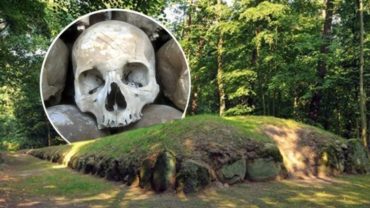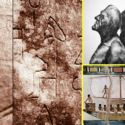Two “Alien” Skulls Discovered In Russia, A Secret Nazi Institution And The Search For The Origin Of Mankind
In what sounds like a scene from an Indiana Jones movie, reports from Russian newspapers “Komsomolskaya Pravda” and “Rossiyskaya Gazeta” indicate that a briefcase and two Alien-like skulls were discovered in the mountains of the Caucasus region of Adygeya. Among the suitcase, its finders found two heads belonging to an unknown creature. Ahnenerbe was probably the most secret society within the SS dedicated to studying the occult and the supernatural forces on Earth. According to researchers, it is likely that members of the SS were interested in the mysteries of the ancient dolmens and the high amounts of radioactivity present in the region known as the Kishinski canyon.
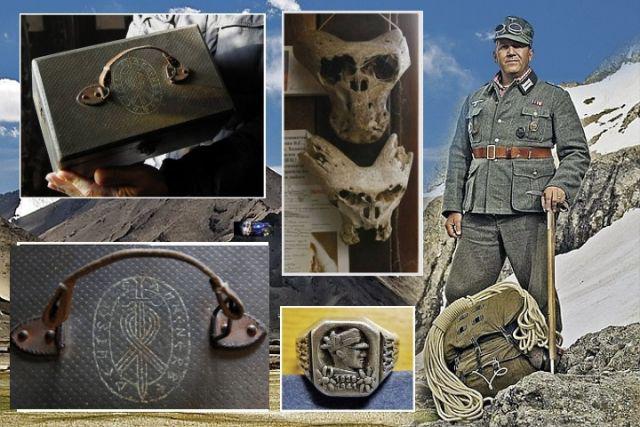
However, researchers believe It is also possible that they were searching for the golden Kuban Rada, lost somewhere in the region during the Russian Civil War (1917-1923). (The Kuban Rada (Russian: Кубанская Рада; Ukrainian: Кубанська Рада) was the leading organization of the Kuban Cossacks, that represented all the heads of the districts.)
Among the items, researchers also discovered a German-made map of the territory of Adygeya believed to have been created in 1941. Experts have been left amazed by the accuracy and completeness of the map.
Historians know many details of operation Wehrmacht Edelweiss which took place at the peak of Elbrus, the highest mountain in Europe, located in the republic of Kabardino-Balkaria in the Russian Caucasus. However, the exact purpose of this mysterious organization in the mountains of Adygea remains a profound mystery, as does the connection between the mysterious briefcase, its contents, and the two strange skulls that do not have a humanoid aspect.
The Ahnenerbe: A mysterious institution with mysterious goals
The Ahnenerbe was an institute in Nazi Germany purposed to research the archeological and cultural history of the Aryan race. The institute conducted experiments and launched numerous expeditions worldwide, attempting to prove that mythological Nordic populations ruled the world in the distant past. The name Ahnenerbe means “inherited from the forefathers.”
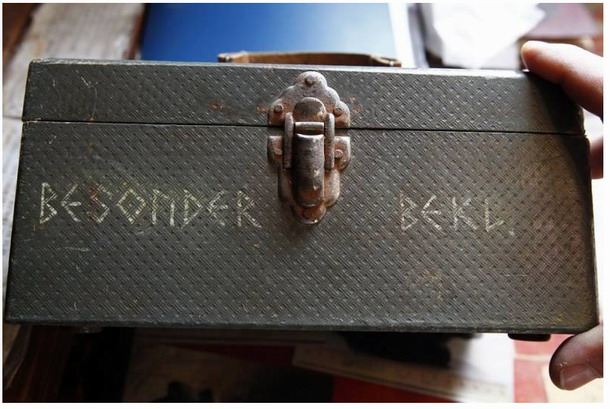
The Ahnenerbe wanted to know everything related to the mysterious and unknown on our planet. They made several expeditions traveling to Tibet, Antarctica, and the Caucasus and had a huge interest in the UFO phenomenon, searching for the ultimate and absolute power.
It is well known to the world that Hitler’s Germany was actively engaged in developing new types of weapons believed to have changed the course of the war. This is why over 300 specialists from different sectors worked in the Ahnenerbe, all brilliant and well-educated minds with great scientific knowledge.
Interestingly, only a few know that years before the war began, specialists in mountain roads from a German military construction organization offered to help the USSR to build a road between Pitsunda and Ritsa (from the coast of the Black Sea now in Abkhazia), as a mean of international cooperation.
After completing the work, the German specialists were discovered to have died mysteriously. Their car plunged into the gap in a curve. Until today, tourists flock to Lake Ritsa through the tunnels built by the Germans.
Russian Water of Life
It was found out later that the construction of this strategic road had very mysterious reasons behind it. It turned out that hydrologists from Ahnenerbe established that the composition of the water taken from a source located in a cave under the lake Ritsa was ideal for making human blood plasma. “The” living water “from Abkhazia was transported in silver containers first to the coast, then by submarine to the bottom of Constance, and finally by plane to Germany,” explains Bormotov, professor of the department of economics and management from Maikop State Technological University. There were even plans to build tunnels for submarines leading from the sea to Ritsa, but the war interrupted these plans.
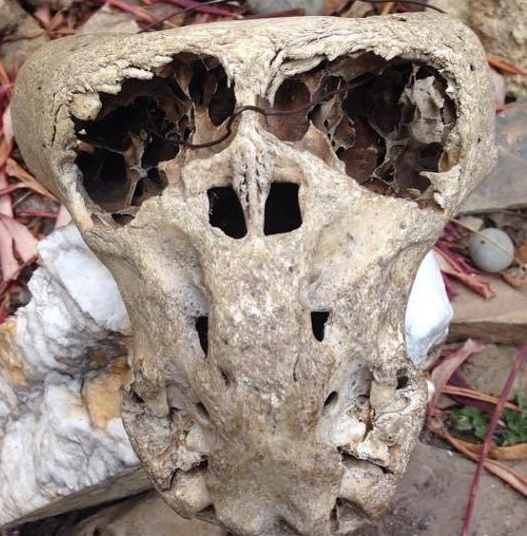
It is well-known that the 49th Mountain Corps of the Wehrmacht, who made the ascent to Mount Elbrus, stayed in the Adygeya region. In the valley of the Belaya River near the Cossack village of Dajóvskaya stood the Westland SS regiment, and located between the rivers Pshish and Psheja tank regiments of Germania were installed. In autumn 1942, the airport of Maikop was visited by the 3rd Squadron of the 14th reconnaissance group, which had twin-engine reconnaissance aircraft dubbed FW-189, equipped with the most sophisticated spy instruments were considered by many as flying secret laboratories.
“That was more than enough to protect the undercover investigations which were possibly performed by the Ahnenerbe in the mountains of Adygea,” says Bormotov. “Maikop was the city where the Wehrmacht had its headquarters. The command of all German military campaigns in the Caucasus was organized.
In autumn of 1942, in the mountains of Adygea, there wasn’t any defined military defensive line, and there were reports of soldiers wandering deep into the mountains. It is not clear why troops were deployed on Mount Pshekish in August 1944 when the frontline moved far to the west. What was it that the Nazis did not have time to finish on Mount Pshekish? Can these mysterious movements be explained and related to the investigations of Ahnenerbe researchers?” asks himself Bormotov.
Many people assume that the Nazis were interested in the dolmens, the prehistoric constructions attributed to the Atlantean builders located in the region, and “the gateway to parallel worlds.”
Even today, people are still talking about unusual events in the area. Recently, an article in the local press spoke about the discovery of a giant skeleton of three meters in height that belonged to an unknown human race in the Borjomi canyon.
The skulls of the Gods
Russian media writes that the mysterious skulls were found in a cave on Mount Bolshoi Tjach nearly two years ago by explorers led by ethnographer Vladimir Melikov.
According to Melikov, the creature of one of the skulls was unlike anything known to man, and it walked on two legs. Melikov states that among the most mysterious features of the skulls is the absence of cranial vaults and jaws. The eye sockets are unusually large, having facial features resembling humans.
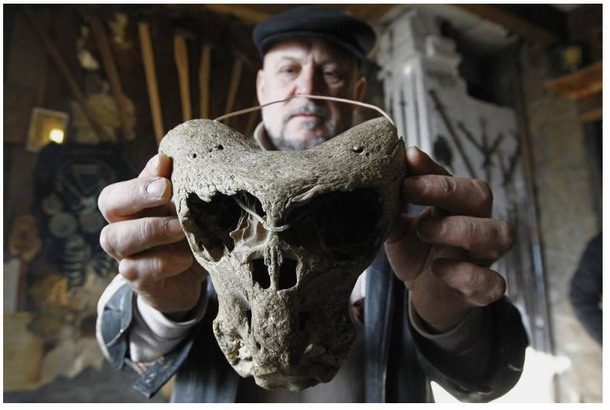
Even when compared with the skull of a bear, it’s hard to think that you do not have the remains of an alien creature in your hands, said Melikov.
Paleontologists in Moscow weren’t too excited when they received photographs of the mysterious skulls. They merely acknowledged that the heads are unlike anything they had ever seen, suggesting that the domes could have been submerged and exposed to sand for long periods, something that could have altered the shape of the skulls, but, if this were the case, how can we explain the nearly identical ‘deformations’ in both heads which seem to follow similar patterns?
Speculations or reality? The Ancient Anunnaki in Russia
Some researchers went as far as to connect the mysterious skulls to the Ancient Anunnaki. After looking at the images, many suggest that researchers from the Ahnenerbe sought these spooky skulls since they belonged to the visitors from the Stars, the gods, and creators of the human race, and researchers from the Ahnenerbe knew exactly what they were looking for.
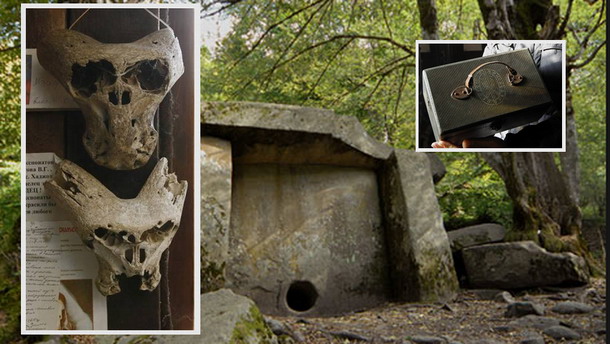
“We can build all kinds of versions and conjectures, but the truth is that the remains found in the mountains of Aguideya will force you to re-think everything you know,” he said Bormotov to Russian newspapers.
In conclusion, we can say that these mysterious findings are something that makes you wonder what else is out there. It makes you think about other secret institutions with similar ideas and plans as the Ahnenerbe. The skulls and items discovered in Russia will remain as some of the most mysterious findings made in the last decade, and the truth behind them seems far more bizarre than what we can imagine.
Sources: ancient-code.com

